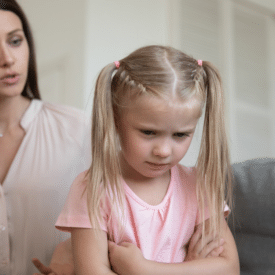
6 Ways To Help Your Preschooler Use Words When They’re Feeling Big Emotions
The emotions and feelings preschoolers have are big and real and, sometimes, scary for them to process. Preschoolers often act out physically because they either lack the ability to speak clearly or effectively or they don’t yet have the vocabulary to express how they feel. Helping children to process and explain their emotions is where parents and caregivers can assist. But how… how can you help your preschooler use words when they’re feeling big emotions? At Growing Brilliant we are here to help with 6 ways you can help your child understand, verbalize, and process how they are feeling!
1. Help Them Build An Emotional Vocabulary
Has your preschooler ever scrunched their face and then thrown the puzzle they’ve been attempting all over the floor? Have you ever been on the receiving end of a slap when you told them it was time to go to bed? As adults, we know they acted out of frustration and anger but your preschooler probably doesn’t. Responding by addressing their feelings and emotions, rather than their actions, will help them build a vocabulary to describe the way they feel. For example, if your child throws something in frustration you can respond by saying, “Wow! You must be really frustrated! Are you feeling frustrated? Maybe next time when you feel frustrated you should tell me so I can help you. Do you think you can tell me you’re frustrated next time?” This helps your preschooler start to understand and label emotions. Playing games can also help to make learning emotions fun.
2. Be An Emotional Role Model
Preschoolers are natural observers and often are taking in their environment even when you don’t think they are. Sometimes the best way for a child to learn how to deal with emotions is to watch others, like their parents or caregivers. For example, if you are mad at a friend, explain that to your child and let them know you need to go sit down in a quiet room to calm down, or maybe you can show them how mindful breathing can help. By showing your child how you handle your emotions you help them understand how to process and deal with theirs.
3. Be Consistent
To learn a new concept a child’s brain needs repetition and consistency. When they are learning new emotions, make sure you are checking in with your preschooler regularly. Ask them how they are feeling so they start to become more aware of their feelings early before it reaches the tantrum stage. Keeping the conversation around emotions going in the day-to-day with your child will help them better label their own emotions and they will also start to be able to identify the emotions of others around them.
4. Be A Good Listener
As important as talking to your preschooler is, so is listening to them. When you take the time to listen about how they are feeling and why they did what they did, you help validate their feelings. When a child feels heard and validated, they are more likely to engage with you. Ask your child open-ended questions about what made them feel the way they are feeling or what they felt like inside when they were feeling those strong emotions and then take the time to listen to them. Be patient, it might take them some time to really verbalize things but it is a huge moment when they do! It should help turn that frown upside down!
5. Teach Emotional Coping Skills
Now that you’ve labeled, talked about, and identified a wide range of emotions with your preschooler it’s time to teach them how to better respond. Talk about how walking away, breathing slowly in and out, asking for a parent or teacher to help, sitting quietly, etc are all better ways to deal with their emotions than hitting or kicking or biting. Talk about how their actions can make other people feel and how being nice to friends and others, even when we’re upset, is important. It is important to also remember that what works for you or another child may not work for your preschooler as a coping skill. Have some patience as you and your child learn what works for them. Here is a free printable with a lot of different coping skills to try.
6. Praise Appropriate Emotional Responses
This is a big deal! When you notice your preschooler handling their emotions appropriately, or they label the emotion correctly, give them praise. Positive reinforcement ensures that even though your child may not be happy at that moment they will remember they got a good reaction for recognizing how they felt and for using a coping skill. A quick hug or short conversation to let them know you noticed their coping mechanism can lift their spirits and let them know that how they chose to handle their feelings was the correct choice in that situation.
Preschool Can Help With Big Emotions Too
Preschool is a great way for children to learn to listen, engage with others, share, and take turns. That can lead to BIG emotions sometimes. This social and emotional learning is so important to a preschooler’s overall education. Our Growing Brilliant staff and teachers are wonderful at teaching and talking through emotions with our preschoolers. Learn more about our online preschool program or sign up for a free trial class today!


